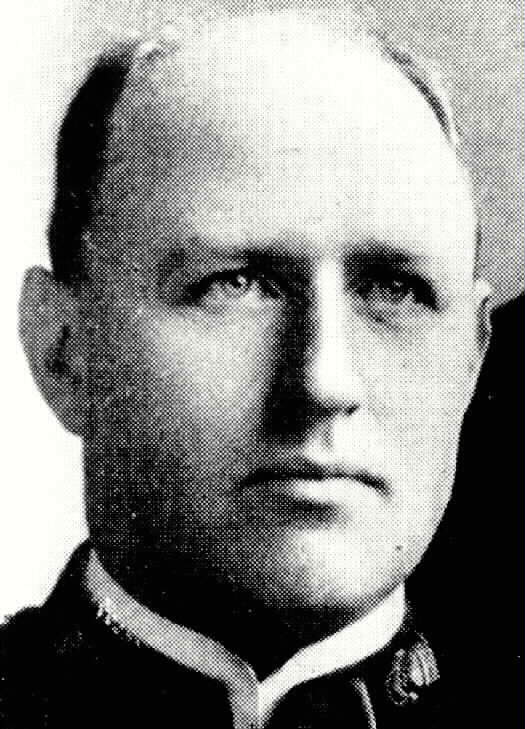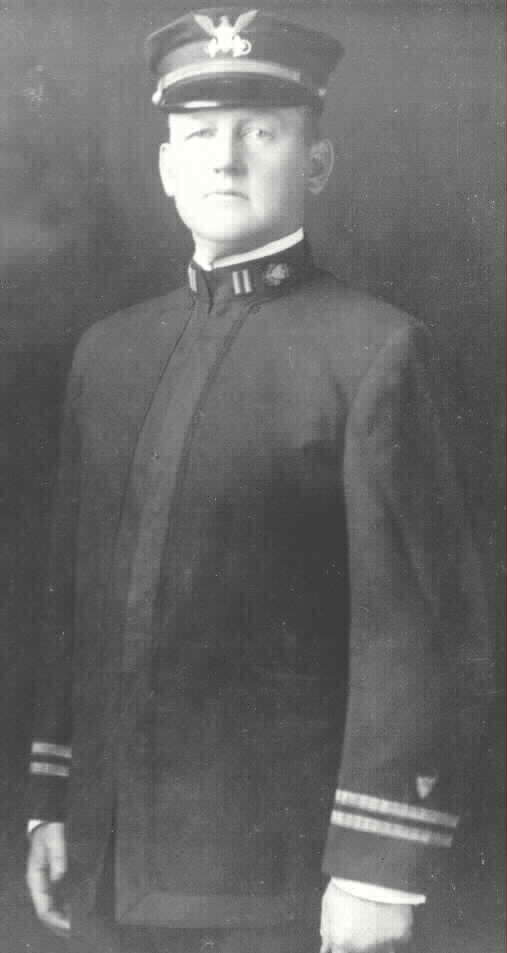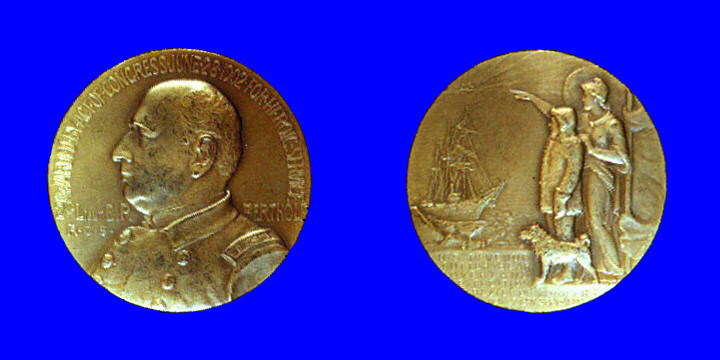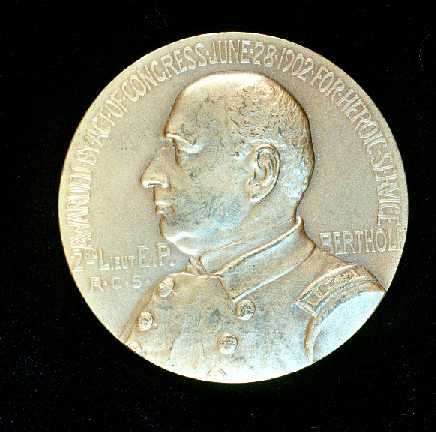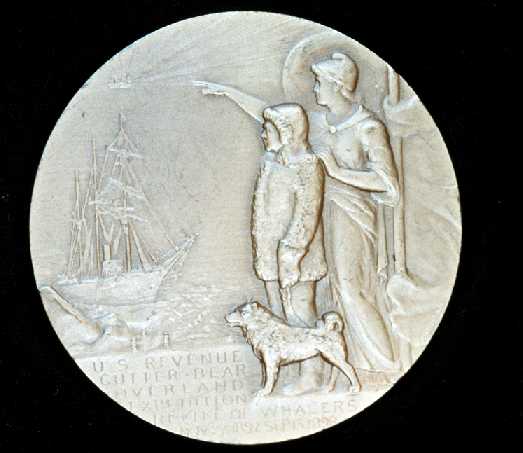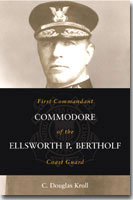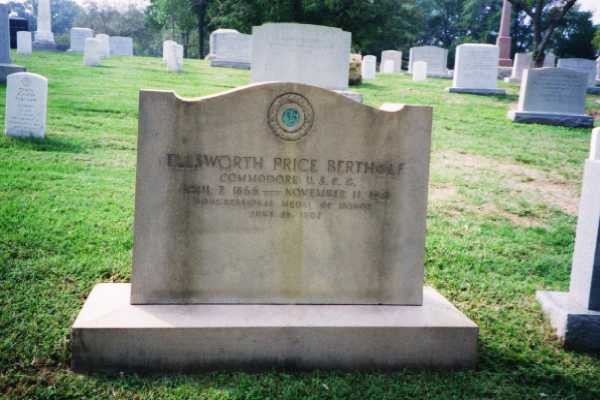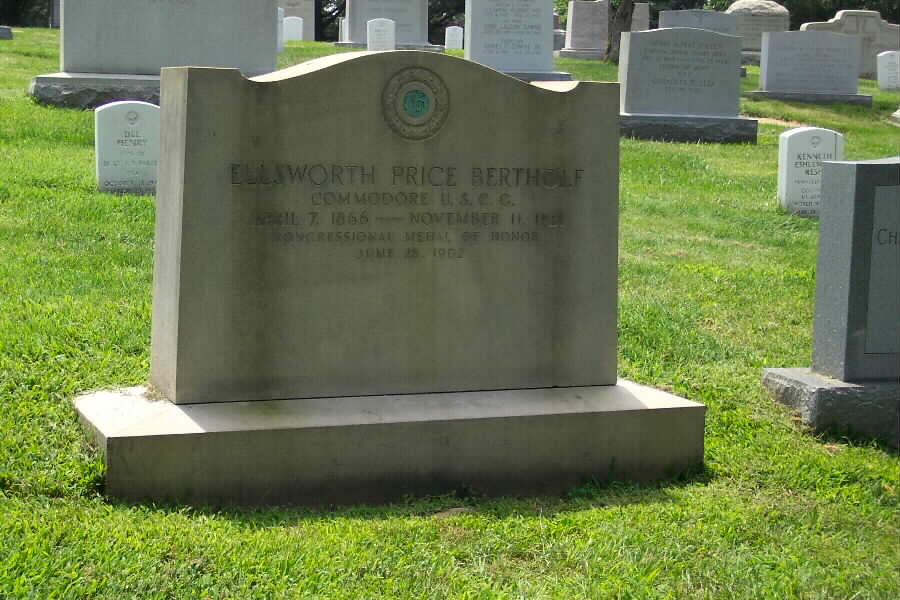Courtesy of the United States Coast Guard:
Commodore Bertholf was born in New York City on 7 April 1866. He entered the Revenue Cutter Service as a cadet on 14 September 1885. He graduated and was appointed a third lieutenant on 12 June 1889. He served through all grades of the Service, on ships stationed along various parts of the coast of the United States and Alaska.
His most noted service had been in connection with Alaska. In 1897 he led the relief party which made the famous overland trip in mid-winter to Point Barrow. Congress voted him a gold medal for this relief of over two hundred American whalers in danger of starving when their vessels were crushed in the ice. In the winter of 1901, Bertholf made a trip across northern Siberia by sledge at the request of the Bureau of Education. The purpose of this mission was the purchase of a reindeer herd to be used by the Inuits of northern Alaska.
He was appointed Captain Commandant of the United States Revenue Cutter Service on 19 June 1911 and re-appointed to the same office in January 1915 when President Wilson joined the Revenue Cutter Service with the Life-Saving Service to form the U.S. Coast Guard. He served as one of the American delegates to the International Conference on Safety at Sea held in London in 1912. In addition to his duties as Captain Commandant of the Coast Guard, Bertholf also served as chairman of the Interdepartmental Board on International Ice Observation and Patrol in the North Atlantic and of the Board on Anchorage and Movements of Vessels.
During the First World War Captain Commandant Bertholf held the temporary rank of Commodore. Upon his retirement as Commandant of the Coast Guard on 30 June 1919, he became one of the vice presidents of the American Bureau of Shipping and was a most active, influential, and important factor in the affairs of that institution. He also made quite an extensive European tour to expand this American organization in foreign fields. He died at his residence at Bretton Hall Hotel in New York City on 11 November 1921.
Commodore Bertholf was laid to rest with full military honors in Section 3 of Arlington National Cemetery. He is buried next to his nephew, Charles Mariner Bertholf, Captain, United States Navy, and his nephew’s son, Charles Mariner Bertholf, Jr., Captain, United States Marine Corps. His brother, Wallace Bertholf, Captain, United States Navy, is also buried in Arlington National Cemetery.
BERTHOLF, ELLSWORTH PRICE
CG United States Coast Guard
- VETERAN SERVICE DATES: Unknown
- DATE OF DEATH: 11/11/1921
- DATE OF INTERMENT: 11/11/1921
- BURIED AT: SECTION 3 SITE 3923
ARLINGTON NATIONAL CEMETERY
Congressional Gold Medal Recipients
Since the American Revolution, Congress has commissioned gold medals as its highest expression of national appreciation for distinguished achievements and contributions. Each medal honors a particular individual, institution, or event.
Although the first recipients included citizens who participated in the American Revolution, the War of 1812 and the Mexican War, Congress broadened the scope of the medal to include actors, authors, entertainers, musicians, pioneers in aeronautics and space, explorers, lifesavers, notables in science and medicine, athletes, humanitarians, public servants, and foreign recipients.
In addition to the requirement that all Congressional Gold Medal legislation must be cosponsored by at least two-thirds (290) of the Members of the House, specific standards are set forth by Rule VII (c)(vii) of the House Committee on Banking and Financial Services’s Subcommittee on Domestic and International Monetary Policy when considering such legislation. Additionally, the Senate Banking, Housing and Urban Affairs Committee requires that at least 67 Senators must cosponsor any Congressional Gold Medal legislation before the committee will consider it.
An Act Directing the Secretary of the Treasury to bestow medals upon First Lieutenant David H. Jarvis, Second Lieutenant Ellsworth P. Bertholf, and Samuel J. Call, surgeon, all of the Revenue-Cutter Service.
“Be it enacted by the Senate and House of Representatives of the United States of America in Congress assembled, That the Secretary of the Treasury is hereby directed to bestow a gold medal of honor, of such design as he may apprve, upon First Lieutenant David H. Jarvis, Second Lieutenant Ellsworth P. Bertholf, and Doctor Samuel J. Call, surgeon, all of the Revenue-Cutter Service and members of the overland expedition of eighteen hundred and ninety-seven and eighteen hundred and ninety-eight for the relief of the whaling fleet in the arctic regions, in recognition of the heroic service rendered by them in connection with said expedition.
SEC. 2. That the sum of one thousand dollars, or so much thereof as may be necessary for the purchase or manufacture of said medals, is hereby appropriated out of any money in the Treasury not otherwise appropriated.” 32 Stat. 492
Commodore Ellsworth P. Bertholf
First Commandant of the Coast Guard
by C. Douglas Kroll
Naval Institute Press, $36.95
When Ellsworth P. Bertholf was court-martialed and dismissed from the Naval Academy for a hazing incident, no one could have predicted his future greatness. But undaunted by his experience at the academy, Bertholf pursued a career in the U.S. Revenue Cutter Service and by 1902 had earned a special Gold Medal of Honor from the U.S. Congress for his role in a dramatic overland relief expedition to Alaska.
By 1915 he had bypassed twenty-two officers senior to him to become the first Commandant of the U.S. Coast Guard and went on to successfully steer his fledgling service through the trials of World War I. This biography of the man who has been called the savior of the Coast Guard offers a revealing portrait not only of Bertholf but also of the last years of the Revenue Cutter and Life-Saving Services and the early formative years of the Coast Guard.
Written by a former Coast Guard officer, the book chronicles Bertholf’s colorful early career with the service when he patrolled the vast reaches of the Pacific, enforced maritime laws regulating the fishing, sealing, and whaling industries, participated in daring rescues, and transported Siberian reindeer from Russia to the starving Inuits. As the only biography of Bertholf ever written, his book makes an important contribution to the history of an armed service that receives little recognition for its contributions to the nation.
C. Douglas Kroll, a USCG Academy graduate with a Ph.D. in history from the Claremont Graduate University, teaches at the College of the Desert in Palm Desert, California.
COMMODORE E. P. BERTHOLF, ARCTIC HERO, DEAD
Congress Gave Him a Gold Medal for His Rescue of 265 Whalers Caught in the Ice
NEW YORK, New York, November 12, 1921 – Commodore Ellsworth P. Bertholf, who served in the Coast Guard for more than thirty years and was appointed to command of the Revenue Cutter Service in 1911 by President Taft, died suddenly in his apartment at Bretton Hall of heart disease. He was well known on every coast of the United States and Alaska, and knew the sea boundaries of the country as did few other men.
Commodore Bertholf was born in New York on April 7, 1866. He entered the Revenue Cutter Service as a Cadet in 1885. He was a Lieutenant when he went north with Captain Francis Tuttle on the cutter Beat and led the last long overland dash to the rescue of 265 whalers who were caught in the ice off Point Barrow. So well did Bertholf organize his expedition that not a man was lost, and it succeeded so perfectly that Congress awarded him a gold medal. Little was heard of it at the time because Berthold had the experience that Shackleton later had, of coming out of the wilderness of snow during a war. He did not know until months after it began that the Spanish-American War was on, and did not head of Manila Bay until long after that battle.
When it came time in 1911, however, to choose a commandant of the Revenue Cutter Service Captain Bertholf’s services were brought to the attention of President Taft and he decided to appoint him to the post of Commodore, largely because of his heroic, if matter-of-fact, dash to Point Barrow.
Commodore Berthold retired on June 30, 1919, and since then has lived in this city. He is survived by his wife.
BERTHOLF, ELLSWORTH PRICE
United States Coast Guard
- DATE OF DEATH: 11/11/1921
- BURIED AT: SECTION 3 SITE 3923
ARLINGTON NATIONAL CEMETERY
Michael Robert Patterson was born in Arlington and is the son of a former officer of the US Army. So it was no wonder that sooner or later his interests drew him to American history and especially to American military history. Many of his articles can be found on renowned portals like the New York Times, Washingtonpost or Wikipedia.
Reviewed by: Michael Howard

